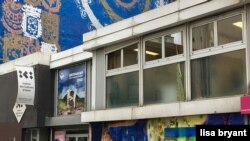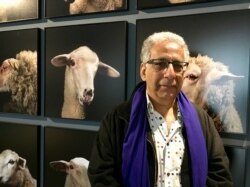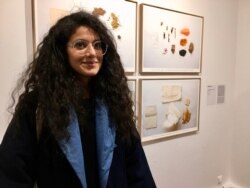The coronavirus has upended the world’s artistic scene, delaying major events such as Africa2020 in France, designed to showcase African art, science and technology. But as French museums begin reopening this week, one exhibit is back on track.
After weeks of lockdown, the gritty and ethnically diverse Goute d’Or neighborhood of northern Paris is returning to its bustling self. So is its Institut des Cultures d’Islam.
The institute’s exhibit, “Croyances” or “Beliefs,” was shuttered just days after opening, as France went into lockdown. Now, it is reopening to a small number of daily visitors. It’s the first of a series of African cultural events the institute is hosting this year.
“It’s a way to show how artists can speak about their spirituality, what they can invest through objects, gods. It can even be flowers or the internet, as we show in the exhibition,” says Jeanne Mercier, the curator of the exhibit, which features the works of 16 photographers and video artists. Some are African or of African origin. Others have spent years working on the continent.
"It’s really a mix of artists who are traveling, like ideas … and who are always renewing … the iconography of what we think about Africa,” she added.
The exhibit examines the power of religion, superstition and myths across Africa from a rainbow of perspectives — from cults and witchcraft, to religious pilgrimages and ceremonies — to what is arguably our newest religion: the internet. The works are thought-provoking, like a series of photos of an African pope.
And sometimes humorous, like portraits of myriad sheep. Photographer Nabil Boutros wanted to bring a lighter touch to his exploration of religions and man’s interaction with his environment.
“The three … monotheistic religions say God gave you this, you have the disposal of all of this. You can do whatever you want. Which is not the case of many other religions — they consider humans as part of the universe,” said Boutros.
Btihal Remli traveled across her parents’ native Morocco for her so-called "Djinni Diaries." They look at djinn — supernatural creatures capable of both good and bad — which originated in pagan beliefs.
“It’s forbidden to practice magic, but the belief in djinn is something rather than magic. It’s something mentioned in the Quran, so you have to believe in it. … If you deny the existence of djinn, you would deny Islam itself," said Remli.
French photographer Eric Guglielmi spent years working in Africa. His work here features the annual celebrations of a revered Sufi figure, Ahmadou Bamba, in Senegal’s holy city of Touba.
Guglielmi says people are open to being photographed in Africa. The bigger challenge in Touba, he says, was explaining what a white, atheist foreigner was doing taking pictures of such a sacred event. That inevitably triggered discussions — sometimes long ones. But Guglielmi says he was always treated with tolerance.
During the lockdown, the Islamic Institute offered virtual tours. Now that it has physically reopened, “Beliefs” will run beyond its official end date in July.








